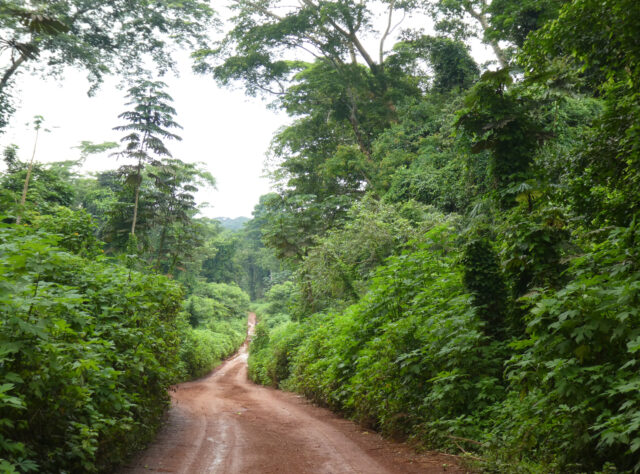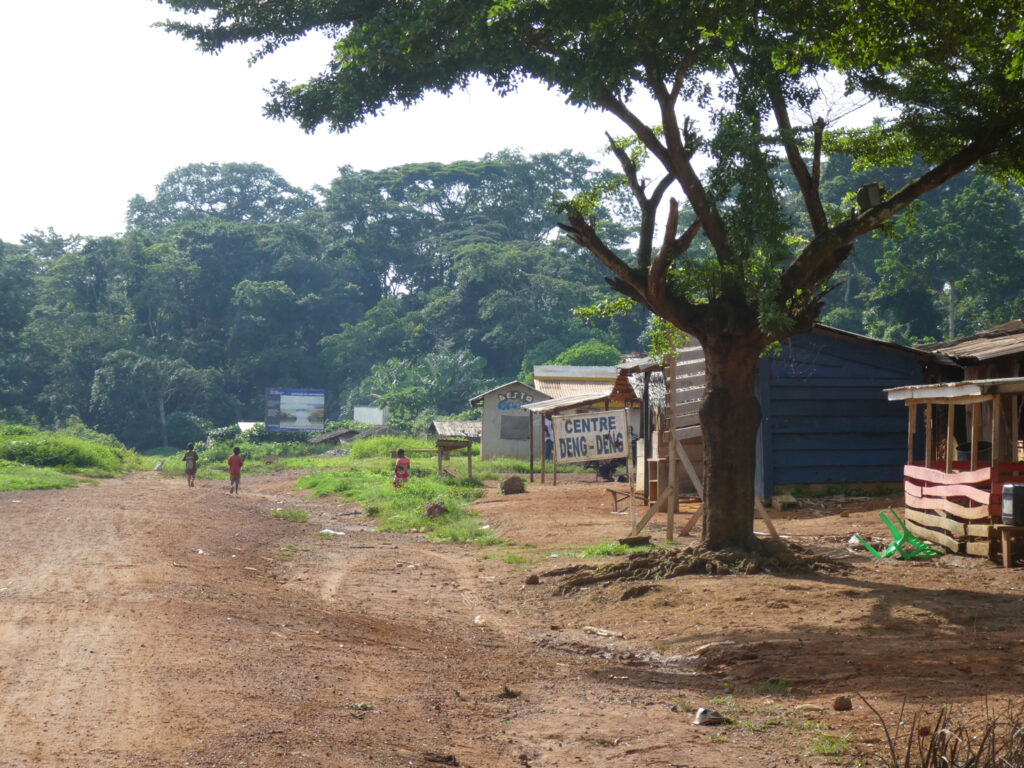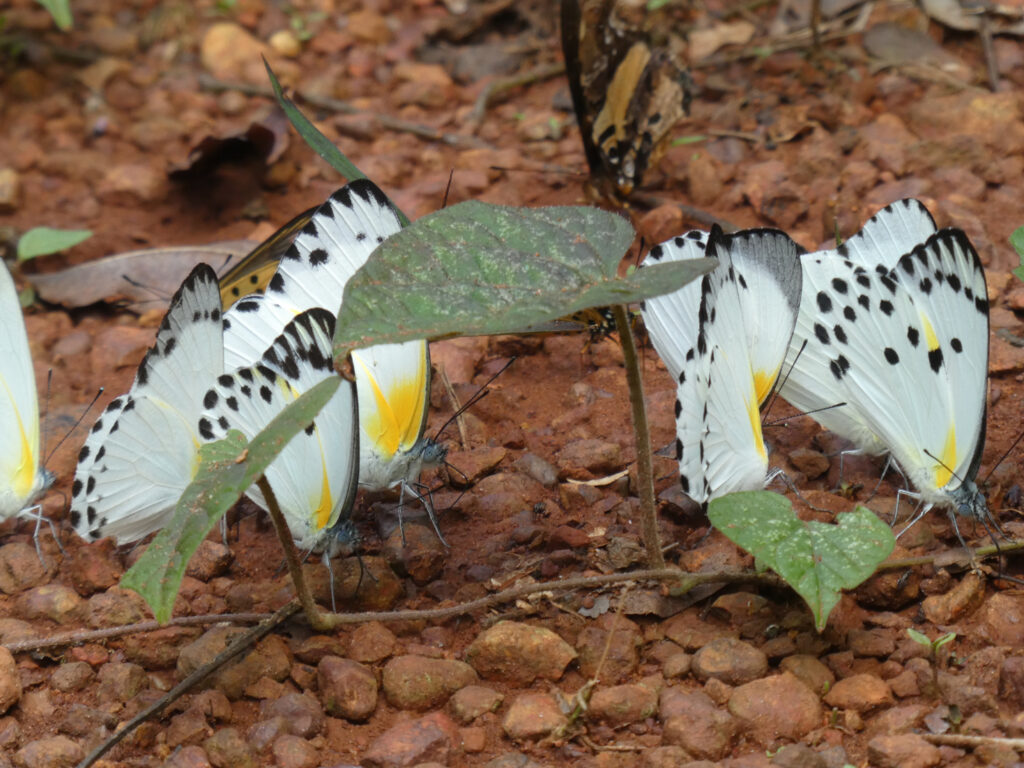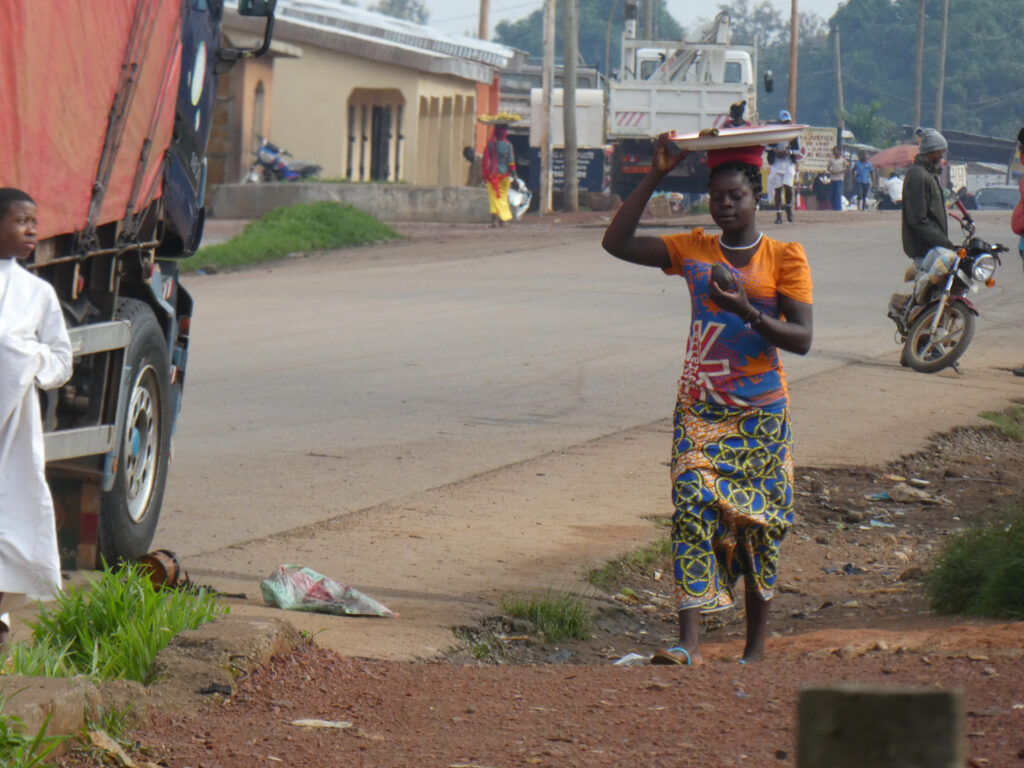
Richard’s visit opened a window into the pristine ecosystem the #FutureForGorillas appeal wants to protect, a canopy of giant buttress-rooted trees reaching 40 metres high over a sub-layer of shrubs and others. Image: Richard Cuthbert/WLT.
Richard Cuthbert, Director of Conservation at World Land Trust (WLT), travelled to Cameroon last year to inspect the land our new #FutureForGorillas appeal wants to protect. What follows is his recollection of the trip and why it is crucial to protect great apes from a fate of isolation and decline.
The persistent mechanical whine from the truck’s front wheel had risen to a metallic screech over the last half hour of driving, before we finally ground to a halt at a small intersection of orange iron-rich dirt roads – a vivid contrast to the lush green forest that surrounded them.
Our driver and Louis Nkembi, CEO of the Environment and Rural Development Foundation (ERuDeF) who was hosting my visit, climbed out of the car with grave looks of concern, as we still had another day’s driving ahead of us to connect to my international flight. In contrast, I tried to hide a look of blessed relief as I unfolded my legs and staggered stiff-limbed from the back seat of the truck where I’d been jammed for the preceding three hours.
We had stopped on the edge of Deng Deng National Park in eastern Cameroon, a key forest reserve home to the most northerly population of Western Lowland Gorilla, as well as populations of Chimpanzee, African Forest Elephant, Pangolin and a large diversity of birds, plants and many others.

At Deng Deng, Richard witnessed the preparations by WLT partner ERuDeF for a forest corridor spanning 23,692 acres, split into two new reserves they are now trying to create with support from your donations. Image credit: Richard Cuthbert/WLT.
I had been in Cameroon for six days on a whistle-stop tour of the country and some of ERuDeF’s projects. The trek had taken in over 2,000 km of rough and bumpy roads, moving from the southwest of the country to its far north bordering Nigeria and finally bringing me to the east and Deng Deng.
It was my last full day in the country and notwithstanding the truck – which now sat with one wheel removed and with a cluster of ground-down bearings in a tin cup – my only chance to see the threats and assess a potential WLT project bordering the national park.
It was also, if I was very lucky, my last chance to catch a glimpse of some of Deng Deng’s wildlife: Gorillas – my lifelong ambition – and also the elusive Grey-necked Picathartes (Grey-necked Rockfowl), a bald-headed crow-sized bird that only occurs in primary rainforests of Central Africa.
A forest corridor to save great apes from human encroachment
Louis and I, along with two of his team and a local park ranger, set off on foot walking along the track that ran along the southern border of Deng Deng National Park.
It was a small narrow road and with seemingly no traffic, but as with many countries the road provided both a route of travel and a route of forest loss. Signs of encroachment into the national park and council forest areas to the south were obvious both sides of the track: small patches of cleared garden areas and the tree stumps, sawdust and debris of illegal timber cutting.
These were not new activities and where it was possible to obtain a view, a 50-metre strip of new and abandoned gardens and young regenerating forest areas was clearly visible on either side of the track, beyond which lay the large mature trees and closed canopy forest of the national park and council forest.

Richard’s trip offered a glimpse into Deng Deng’s wildlife, with butterflies collecting salts and water on land they share with Gorilla, Chimpanzee and many others. Image: Richard Cuthbert/WLT.
As we walked Louis and Gwendoline Angwa, ERuDeF’s project manager, explained the growing threat of encroachment in these border areas, which if unchecked would isolate Deng Deng National Park and its populations of gorillas, chimps and many other species from connecting forests to the south.
The critically endangered Western Lowland Gorilla, with their low population of a few hundred individuals in the park, are most threatened by this encroachment. Their small numbers are inherently at higher risk from genetic isolation and the further losses of even a few individuals.
ERuDeF’s initial plans were to establish two community forest reserves, totalling around 10,000 hectares in area, to protect these remaining buffer areas and to work with local communities to ensure their successful management – thereby ensuring the connectivity of Deng Deng’s forests to the Belabo Council Forest to the south.
These plans were part of ERuDeF’s long-term vision of ensuring a forest corridor from Deng Deng to Dja Biosphere Reserve – a vast area of forest in the south of Cameroon bordering with forests in Gabon and Congo.
The community’s involvement was key in these plans, as the encroaching garden areas and timber cutting were providing income to families who otherwise had a largely subsistence lifestyle, and who would be supported during the project through ERuDeF’s Education for Sustainable Development Programme, which they had successfully implemented in other areas of Cameroon.
A fleeting glimpse into a future of forest protection for Cameroon
We walked and talked for another hour through further border areas of the park before the first traffic of the day – three motorcycles – came around the bend.
After a brief negotiation, lifts were arranged taking us to the small village of Deng Deng (where we stopped for an incongruous cold bottle of Guinness) and then followed another track that cut through the national park on a loop back to our vehicle.

ERuDeF’s approach – community reserves – means donations to #FutureForGorillas will extend a helping hand to the people around the reserves, with plans to support schools and livelihoods. Image: Richard Cuthbert/WLT.
All chances of glimpsing gorillas, chimps or Picathartes evaporated in a blue haze of 2-stroke motorbike exhaust and engine noise, but what was still clear as we sped along was the forest quality within the national park: giant buttress-rooted trees reaching 40 metres high and an intact multi-structured under-canopy of shrubs, smaller and emergent trees, vines and lianas.
Four hours after we had set off, we rounded a final bend before stopping again at the guard post. ERuDeF’s vehicle had four wheels again, along with new(ish) bearings, grease and other parts, which had somehow been conjured during our absence. The five of us squeezed back into the vehicle for the drive back to the town of Bertoua and then (without any further breakdowns) six hours to the capital Yaounde and to my departing flight.
As always, it was a too-brief and fleeting visit, but still long enough to appreciate the detail and commitment of Louis and his team – to understand the importance and urgency of the corridor project they are now working to deliver, with support from your donations.
This year, you have a historic chance to protect the pristine forests Richard visited. Your donations to our new appeal will do something extraordinary – they will come in time to save tropical forests from poaching and logging, they will rescue Deng Deng’s Gorilla, Chimpanzee, Pangolin, Leopard, Elephant and many others from a fate of genetic decline.
